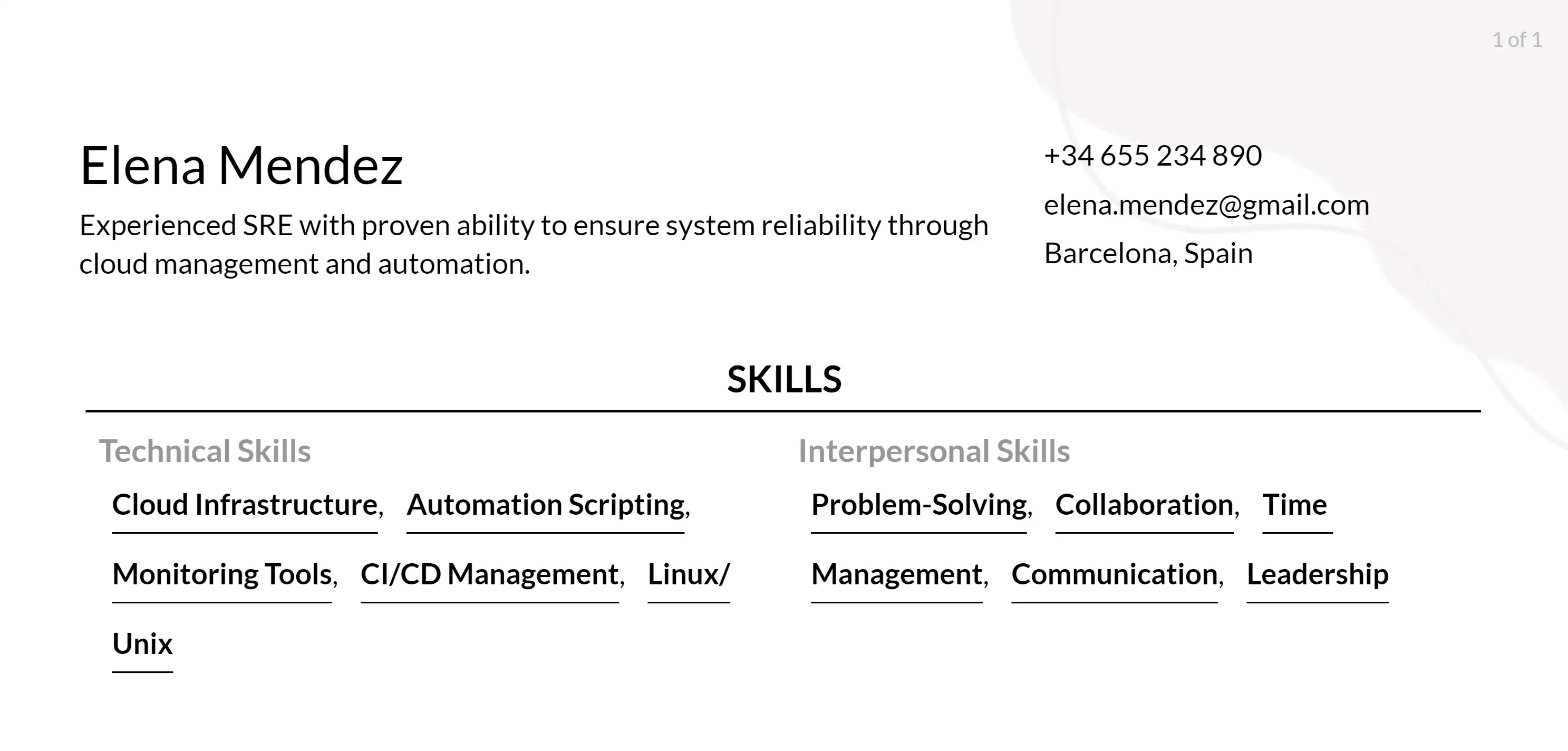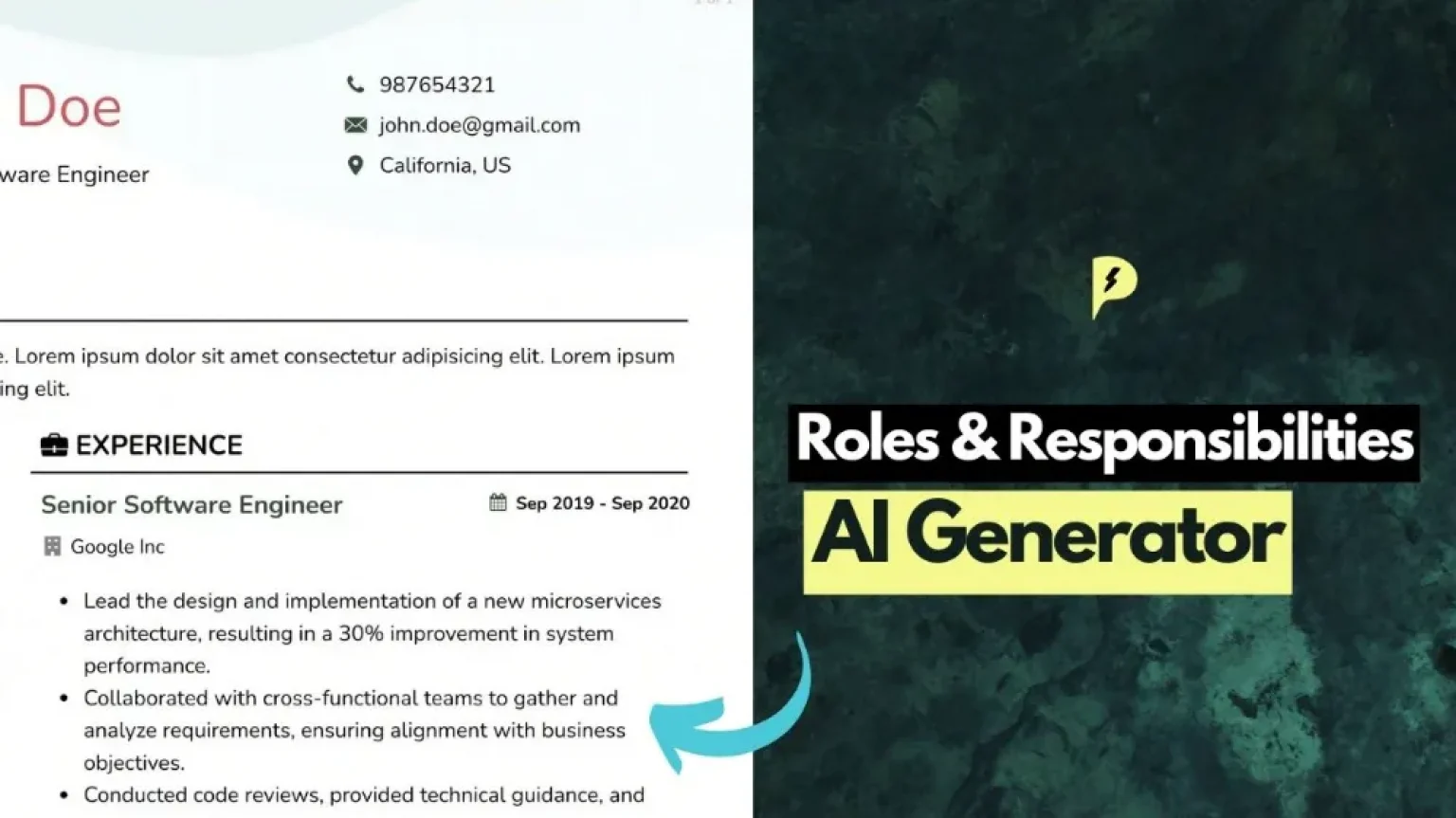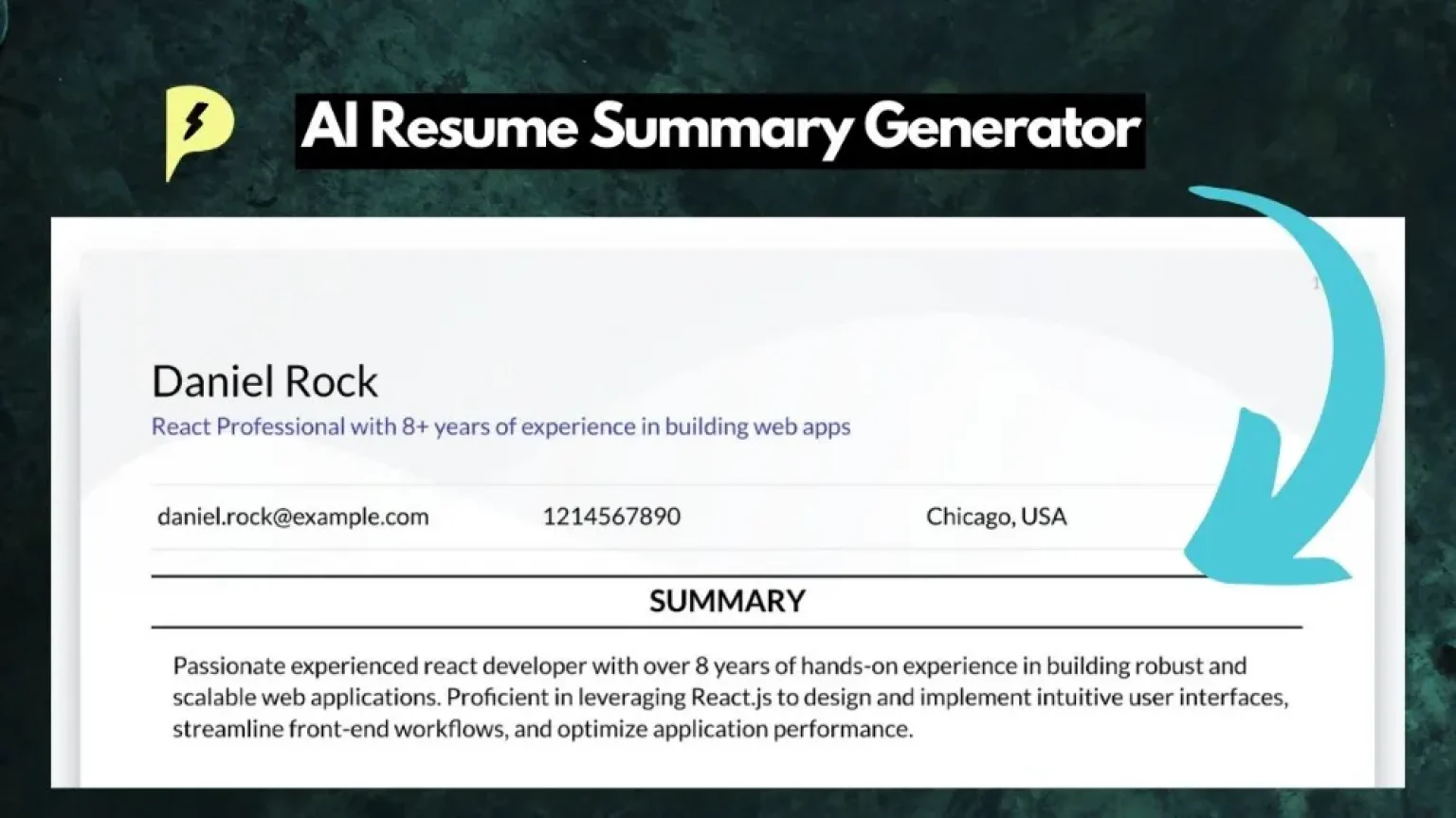Site Reliability Engineers (SREs) bridge the gap between development and operations, ensuring systems are reliable, scalable, and efficient. Highlighting the right mix of technical and soft skills on your resume can set you apart in this vital role. From cloud infrastructure management to collaboration, the skills outlined cover what’s needed at both entry and senior levels to show you’re ready for the job.
Required Site Reliability Engineer Skills To Put On Resume
Whether you’re starting out or you’re an experienced pro, there are some must-have skills every SRE needs on their resume. These include expertise in cloud infrastructure, automation, and monitoring, along with problem-solving abilities and teamwork. Mastering these key skills shows you can maintain high availability and ensure smooth operations. Below listed are some of the definitely needed Site Reliability Engineer skills to put on resume for all levels in this role.
Hard Skills
- Cloud Infrastructure Management
- Automation Scripting
- Monitoring and Alerting Tools
- CI/CD Pipeline Management
- Linux/Unix System Administration
- Cloud Infrastructure Management: Managing cloud platforms like AWS, Azure, or Google Cloud is crucial for handling scalable and resilient systems.
- Automation Scripting: Automating repetitive tasks through scripts in Python, Bash, or Ansible improves efficiency and reduces manual errors.
- Monitoring and Alerting Tools: Familiarity with tools like Prometheus, Grafana, or Datadog helps in proactively identifying and addressing system issues.
- CI/CD Pipeline Management: Expertise in CI/CD tools like Jenkins or GitLab is necessary for streamlining code deployment and integration processes.
- Linux/Unix System Administration: Strong understanding of Linux/Unix systems is essential for managing servers and troubleshooting operational issues.
Soft Skills
- Problem-Solving
- Communication
- Collaboration
- Attention to Detail
- Time Management
- Problem-Solving: Quickly identifying the root cause of issues and finding effective solutions is a key skill in maintaining system reliability.
- Communication: Effectively conveying technical information to both technical and non-technical teams ensures smooth operations.
- Collaboration: Working closely with development and operations teams fosters better integration and problem-solving.
- Attention to Detail: Being detail-oriented prevents critical errors and ensures high-quality system performance.
- Time Management: Prioritizing tasks and managing time efficiently is important when dealing with multiple system issues simultaneously.
Copy Above Site Reliability Engineer Resume Example and Paste in resume builder
Fresher Site Reliability Engineer: Good To Have
If you’re new to Site Reliability Engineering, focusing on fundamental skills like basic networking, version control, and scripting can make your resume stand out. Pairing these technical skills with soft skills like adaptability and eagerness to learn highlights your potential to grow in this dynamic field. Below listed are some of the good to have fresher Site Reliability Engineer skills to put on resume along with must have skills.
Hard Skills
- Basic Networking Knowledge
- Version Control (Git)
- Scripting Basics (Bash, Python)
- Virtualization Tools (Docker, Kubernetes)
- Database Management Basics
- Basic Networking Knowledge: Understanding basic networking concepts like DNS, TCP/IP, and routing helps in troubleshooting connectivity issues.
- Version Control (Git): Knowledge of version control systems like Git is essential for tracking code changes and collaborating with teams.
- Scripting Basics (Bash, Python): Basic scripting knowledge can help automate simple tasks and speed up routine processes.
- Virtualization Tools (Docker, Kubernetes): Familiarity with containerization tools like Docker and Kubernetes is increasingly important for managing application environments.
- Database Management Basics: Understanding SQL and NoSQL databases is useful for handling data storage and retrieval.
Soft Skills
- Adaptability
- Eagerness to Learn
- Teamwork
- Critical Thinking
- Resilience
- Adaptability: Being flexible and able to adjust to new challenges is crucial in a dynamic environment.
- Eagerness to Learn: Continuous learning is important to keep up with emerging technologies and tools.
- Teamwork: Being a good team player helps in solving complex issues and improving workflows.
- Critical Thinking: Analytical skills allow for better decision-making in troubleshooting and improving systems.
- Resilience: Staying focused and calm under pressure is key when dealing with system outages or critical incidents.
Copy Above Site Reliability Engineer Resume Example and Paste in resume builder
Experienced Site Reliability Engineer: Good To Have
For seasoned Site Reliability Engineers, your resume should reflect advanced capabilities such as Infrastructure as Code (IaC), security best practices, and leadership qualities. These skills demonstrate your ability to design robust, scalable systems while mentoring others and driving strategic improvements. Below listed are some of the good to have senior Site Reliability Engineer skills to put on resume along with must have skills.
Hard Skills
- Infrastructure as Code (IaC)
- Security Best Practices
- Advanced Scripting/Programming
- High Availability (HA) Architectures
- Disaster Recovery Planning
- Infrastructure as Code (IaC): Expertise in tools like Terraform or CloudFormation is essential for managing infrastructure through code, enabling scalability and consistency.
- Security Best Practices: Implementing and maintaining strong security measures helps in protecting systems from vulnerabilities.
- Advanced Scripting/Programming: Advanced coding skills allow for more complex automations and system improvements.
- High Availability (HA) Architectures: Designing systems with high availability ensures continuous service with minimal downtime.
- Disaster Recovery Planning: Creating and maintaining disaster recovery strategies ensures quick restoration of services in case of a failure.
Soft Skills
- Leadership
- Strategic Thinking
- Mentoring
- Conflict Resolution
- Proactive Mindset
- Leadership: Leading teams and guiding them through complex challenges helps ensure the reliability of systems.
- Strategic Thinking: Planning long-term system reliability and scalability aligns the technical aspects with business goals.
- Mentoring: Sharing knowledge and helping junior engineers grow strengthens the overall team.
- Conflict Resolution: Effectively handling disagreements within teams ensures smoother collaboration.
- Proactive Mindset: Anticipating potential issues and taking preventative measures helps avoid costly downtimes.
Copy Above Site Reliability Engineer Resume Example and Paste in resume builder
DO’s & Don’ts For Site Reliability Engineer Skills In Resume
- Include specific technical skills relevant to the role.
- Showcase soft skills that demonstrate your ability to work in teams and solve problems.
- Highlight experience with relevant tools and technologies.
- Tailor your resume to the job description by prioritizing key skills.
- Back up your skills with measurable achievements or examples.
- List irrelevant skills just to fill space.
- Overload your resume with too much technical jargon.
- Forget to balance hard and soft skills.
- Use generic language that doesn’t highlight your unique qualifications.
- Ignore the job description when choosing which skills to feature.
FAQ’s For Site Reliability Engineer Skills In Resume
What technical skills are essential for a Site Reliability Engineer resume?
Cloud infrastructure management, automation scripting, and CI/CD pipeline management are some of the key technical skills that should be included.
How can I showcase soft skills on my Site Reliability Engineer resume?
Highlight soft skills like problem-solving, communication, and teamwork by providing examples of how you’ve used them in previous roles.
What entry-level skills are good to have for a fresher Site Reliability Engineer?
Basic networking knowledge, version control experience, and scripting basics are great skills to highlight as a fresher.
What should experienced Site Reliability Engineers emphasize on their resume?
Experienced SREs should focus on advanced skills like Infrastructure as Code (IaC), security practices, and leadership abilities.
How can I tailor my Site Reliability Engineer resume for specific job applications?
Customize your resume by emphasizing the skills that are mentioned in the job description and aligning them with your past experience.
Conclusion
Incorporating the right Site Reliability Engineer skills into your resume boosts your chances of landing the job, whether you’re a fresher or an experienced professional. By showcasing a balance of technical expertise and soft skills, you can stand out in a competitive job market. Use placements.app resume builder to create your free resume today and get noticed by top employers.



